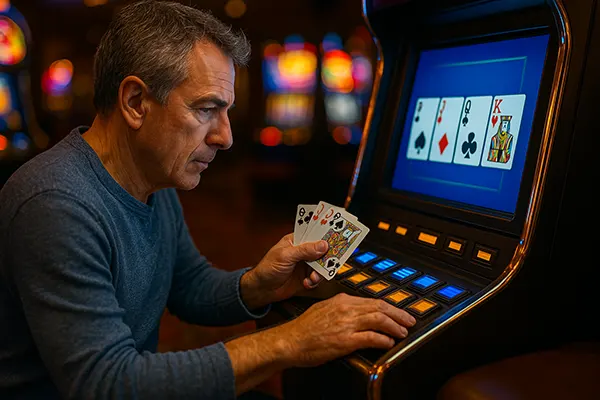Video Poker as a Brain Trainer: How Gameplay Enhances Cognitive Skills
Video poker has long held a reputation as one of the more strategic gambling games, combining elements of luck, probability, and decision-making. Unlike traditional slots, it invites players to engage in critical thinking and tactical reasoning. In recent years, scientists and game theorists have begun to explore its potential as a tool for mental fitness. But can a casino game truly sharpen your mind?
Analytical Thinking and Strategic Planning in Video Poker
At the core of video poker lies a simple yet demanding mechanic: players must decide which cards to keep and which to discard. This decision-making process requires an understanding of poker hand probabilities and statistical likelihoods, reinforcing mathematical reasoning. Players often find themselves mentally calculating odds, a process that stimulates the brain’s analytical centres.
Strategic planning becomes more nuanced as players progress. Choosing the right strategy based on available cards, understanding expected value (EV), and learning to adjust play depending on the machine’s paytable all contribute to a deeper level of engagement. The longer one plays, the more intuitive these strategic patterns become, akin to learning the tactics of chess or bridge.
Moreover, the immediate feedback loop—seeing the results of each decision right away—enhances learning retention. This real-time reinforcement supports neuroplasticity by rewarding correct patterns and gently punishing poor choices, encouraging mental adaptability.
Developing Pattern Recognition and Memory Skills
Video poker reinforces pattern recognition in a way few other games do. Recognising hands such as flushes, straights, or pairs under time pressure stimulates the brain’s pattern-matching functions. With repeated play, players train their ability to spot combinations quickly and accurately, improving visual processing and pattern memory.
Memory is also exercised through repeated exposure to optimal strategies. Many dedicated players memorise hand rankings and statistical strategies for different game types (Jacks or Better, Deuces Wild, etc.). This act of committing complex information to memory is cognitively demanding and akin to learning a foreign language or musical instrument.
By forcing players to recall information rapidly and in context, video poker helps improve both working memory and long-term recall. These skills have real-world benefits, particularly in academic, professional, and everyday problem-solving contexts.
Reducing Cognitive Decline through Regular Mental Stimulation
Recent studies suggest that engaging in strategic games like video poker may help slow age-related cognitive decline. Mental stimulation, especially when it requires logic, memory, and adaptability, has been linked to maintaining brain health in older adults. Video poker offers a dynamic environment that keeps the brain active and challenged.
According to neuroscientific research published in 2024, regular mental challenges promote the development of new neural pathways, a process known as neurogenesis. Video poker’s demand for decision-making and calculation supports this process by consistently pushing players out of mental autopilot.
Furthermore, engaging in mentally stimulating activities like video poker can promote a sense of purpose and enjoyment, which in turn lowers stress and supports overall well-being. Reduced stress and increased cognitive activity create a reinforcing loop that benefits brain health over time.
Moderation and Responsible Play Are Key
Despite its cognitive benefits, video poker must be approached responsibly. Extended gameplay can lead to mental fatigue or compulsive behaviours if not balanced with breaks and awareness. Responsible gaming practices are essential for ensuring the activity remains a positive mental exercise rather than a risk factor.
Setting time limits and avoiding the pursuit of losses help maintain a healthy relationship with the game. It’s also important to view video poker as a supplement to, not a replacement for, other forms of brain training or social engagement. A well-rounded cognitive routine includes physical activity, social interaction, and varied intellectual challenges.
In essence, while video poker offers tangible mental benefits, the context in which it’s played determines its impact. Responsible use transforms it from a mere gambling pastime into a valuable cognitive workout.

Skill Progression and Mental Agility
As players become more proficient at video poker, they often notice improvements in their general mental agility. This is largely due to the game’s demand for fast processing of information and rapid decision-making. Each round presents a new puzzle, and mastering the speed-accuracy trade-off is key to long-term success.
Unlike games of pure chance, video poker rewards skill and learning. As a player’s competence increases, so does their ability to react quickly and correctly to diverse situations. This nurtures quicker thinking and sharper judgement, qualities beneficial in daily life—from work tasks to critical thinking in complex scenarios.
Learning new variations of video poker, such as Bonus Poker or Joker Poker, can further boost adaptability. Each variation comes with its own rules and strategy charts, pushing players to apply learned concepts in unfamiliar contexts—a powerful way to cultivate mental flexibility.
Video Poker in Cognitive Training Research
There’s a growing interest among cognitive scientists in incorporating gamified elements into brain training. Video poker, with its real-world consequences and natural feedback loops, is a promising candidate for such research. Its blend of logic, memory, and adaptive strategy aligns closely with the goals of cognitive enhancement programmes.
Some brain-training applications are already integrating simplified poker mechanics into their platforms. The aim is to harness the same mental challenges that video poker presents while avoiding the risk associated with gambling. This signals recognition of the game’s cognitive benefits even outside the casino.
In future research, we may see video poker used as a controlled cognitive training tool in clinical and educational settings. While further studies are needed, the evidence so far supports its value as more than mere entertainment.
